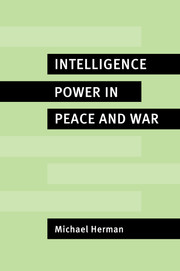Book contents
- Frontmatter
- Contents
- List of figures
- Preface and acknowledgements
- Glossary of terms and abbreviations
- Introduction
- I Evolution and outline
- II Components and boundaries
- III Effects
- 8 Intelligence and national action
- 9 International action
- 10 Intelligence and security
- 11 Intelligence threats
- 12 Intelligence cooperation
- IV Accuracy
- V Evaluation and management
- VI The 1990s and beyond
- VII Summary
- Suggestions for further reading
- Index
11 - Intelligence threats
Published online by Cambridge University Press: 27 October 2009
- Frontmatter
- Contents
- List of figures
- Preface and acknowledgements
- Glossary of terms and abbreviations
- Introduction
- I Evolution and outline
- II Components and boundaries
- III Effects
- 8 Intelligence and national action
- 9 International action
- 10 Intelligence and security
- 11 Intelligence threats
- 12 Intelligence cooperation
- IV Accuracy
- V Evaluation and management
- VI The 1990s and beyond
- VII Summary
- Suggestions for further reading
- Index
Summary
The last three chapters described the various ways in which intelligence is used by those who receive it. This one discusses its indirect effects on its foreign and other targets.
International relations in peacetime consist partly of threats. ‘Each state exists, in a sense, at the hub of a whole universe of threats … [They] vary enormously in range and intensity, pose risks which cannot be assessed accurately, and depend on probabilities which cannot be calculated.’ In war, threats and measures to counter them are basic parts of operations. In both peace and war intelligence collection can be one of the threats. One of its effects in the Cold War was that it added to the total of mutually perceived threats. Another effect is that threats of intelligence collection against them oblige military forces to take information security measures which reduce their operational effectiveness. A third effect is that threats of counterintelligence against intelligence organizations reduce their effectiveness in the same way.
Political effects of intrusive intelligence
It may be true that ‘the greatest intelligence success of the Cold War, for both sides, was the development of the reconnaissance satellite, the effect of which was greatly to diminish the fear of surprise attack.’ But this was hardly how the East and West saw each other's intelligence at the time. Parts of it added to the mutual ‘enemy image’. Here we consider these parts.
- Type
- Chapter
- Information
- Intelligence Power in Peace and War , pp. 183 - 199Publisher: Cambridge University PressPrint publication year: 1996



